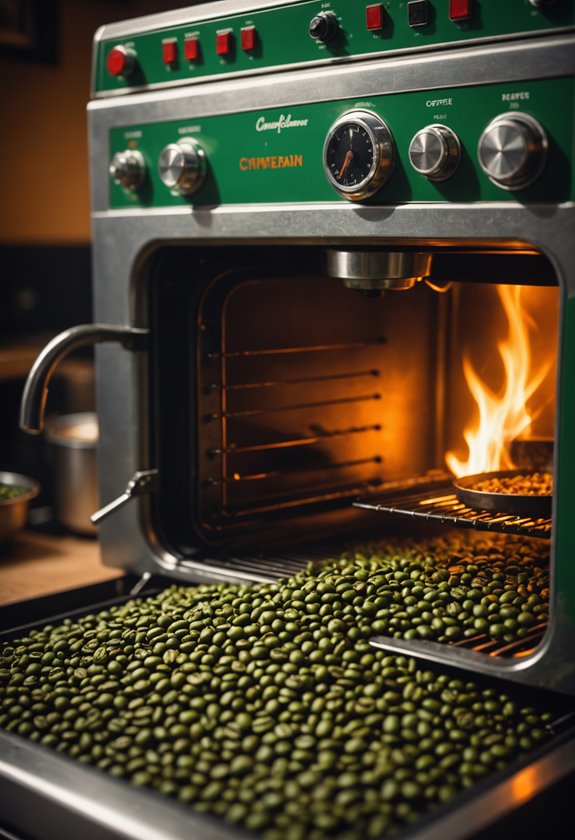Which Country Has the Best Coffee Beans?
When you're searching for the best coffee beans, let's investigate some top contenders, each bringing unique qualities. Ethiopia, often regarded as coffee's birthplace, offers beans with floral and fruity notes, thanks to its diverse climate and rich soils. Colombia, famous for its smooth, chocolatey Arabica beans, provides a balanced flavor profile. Meanwhile, Brazil, the largest producer, delivers beans featuring low acidity and a medium body, ideal for blends. Don't overlook Guatemala, where volcanic soils contribute to strong aromas and spicy tones. Each country's distinct characteristics make it a worthy choice, and there's much more to unearth about their individual contributions.
Key Takeaways
- Ethiopia is celebrated for its unique coffee varieties with floral and fruity notes, offering a wine-like taste.
- Colombia is renowned for high-quality Arabica beans with balanced flavors, mild acidity, and chocolate and caramel notes.
- Guatemala produces high-quality coffee with strong aromas and spicy notes, influenced by volcanic soil and ocean winds.
- Brazil offers coffee with low acidity and medium body, featuring subtle fruity flavors, making it ideal for blends.
- Sumatra's coffee is known for its bold, earthy flavors and low acidity, attributed to its unique wet hulling processing method.
Top Coffee-Producing Nations

When exploring the world of coffee, it's essential to know the top-producing nations that shape the global market. These countries are renowned for their contributions to the coffee industry, providing the quality coffee beans that enthusiasts cherish.
Brazil: The Coffee Giant****
Let's start with Brazil, the largest coffee producer globally. It accounts for roughly 37% of total production. Known for its low-acidity, medium-bodied beans, Brazil provides a strong foundation for the world's coffee supply.
Although it may not top the list for specialty coffee, its volume and consistency are unmatched.
Colombian Coffee: A Balanced Delight****
Colombia ranks third in production, supplying some of the best coffee you'll taste. Its high-quality Arabica beans are famous for their balanced flavor profiles, offering notes of chocolate and caramel.
These high-quality beans enhance Colombian coffee, making it a favorite among connoisseurs.
Ethiopia: The Birthplace of Coffee
Ethiopia, celebrated for its unique varieties, produces specialty coffee with rich flavor. Known for Harrar and Yirgacheffe, Ethiopian coffee offers floral and fruity notes, distinguishing itself in the market.
Guatemala: Central America's Gem
In Central America, Guatemala shines with its high-quality coffee. The Antigua region's sophisticated taste, influenced by mountainous terrain, features a strong aroma with hints of smoke, appealing to those seeking rich flavor.
Vietnam's coffee production ranks second globally, contributing significantly to the world's coffee supply chain.
Unique Flavor Profiles
Having investigated the major players in coffee production, let's focus on the distinct flavor profiles that set each region's beans apart. Coffee in the world varies greatly, offering a range of taste experiences.
Ethiopian coffee, celebrated for its floral and fruity notes, stands out with its wine-like taste, especially the Harrar variety, which can surprise you with hints of blueberry and jasmine. This unique profile is a proof of the quality of coffee farms in this region.
Moving to Colombia, the coffee here is known for its balanced flavor profiles. You'll find mild acidity paired beautifully with chocolate and caramel notes, making Colombian beans among the best for those who appreciate a harmonious brew.
Guatemalan coffee, particularly from the Antigua region, boasts strong aromas and notes of spice, influenced by volcanic soil and ocean winds, offering complexity to your cup.
Sumatran coffee is recognized for its earthy and herbal qualities, processed using a unique wet hulling method that enhances its distinct characteristics.
Meanwhile, Brazilian coffee offers a milder experience with low acidity and medium body, appealing to those who prefer subtle fruity flavors. Each country's growing coffee methods contribute to these rich and varied profiles.
For those seeking premium quality beans, Arabica blend coffee offers a consistently smooth and balanced taste profile that complements any brewing method.
Factors Influencing Quality

Understanding what influences the quality of coffee beans is fundamental for appreciating the subtleties in your cup. Various factors come into play, each contributing uniquely to the coffee quality. Let's investigate these essential elements:
1. Altitude: Coffee grown at higher elevations, like in Costa Rica, often boasts a brighter acidity and complex flavor profile. The cool climate conditions slow the bean maturation, enhancing its taste.
2. Processing Methods: The way beans are processed—washed or natural, for instance—greatly impacts their flavor. Natural processing can bring out fruity and sweet notes, adding to the coffee's unique character.
3. Soil Composition and Climate Conditions: The soil where coffee is cultivated, along with climate factors like rainfall and temperature, considerably shapes the beans' flavors.
Volcanic soils, particularly in regions like Costa Rica, contribute to rich and distinctive taste profiles.
4. Freshness and Traceability**: Freshness** is critical; beans lose flavor over time. Knowing the roast date and batch size guarantees you get the best taste.
Additionally, traceability in coffee sourcing builds trust, enabling you to follow the supply chain and guaranteeing high-quality, organic coffee.
Minas Gerais region in Brazil exemplifies how diverse climates and altitudes can produce exceptional coffee varieties.







